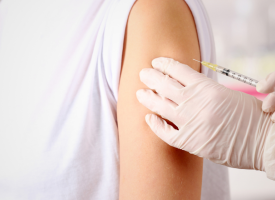Transcript - Dr Gannon - SKY News - FASD, E-cigarettes, Aged Care
Transcript: AMA President, Dr Michael Gannon, SKY News, Live Now with Ashleigh Gillon, Wednesday 14 February 2018
Subject: Juvenile incarceration and FASD, E-cigarettes, Aged Care facilities.
ASHLEIGH GILLON: A new report out today showing nine out of 10 incarcerated kids have some form of neuro-disability is earning headlines around the country. I am going to be speaking about this a bit more shortly with a researcher from the Telethon Kids Institute, which has conducted this research.
But first, I'm going to bring you some reaction from the AMA President, Dr Michael Gannon, who joins us live from Perth. Dr Gannon, appreciate your time. What do you make of these findings that tell us that most of these kids had previously been undiagnosed, despite the fact that they'd had multiple contacts with Government and other agencies throughout their short lives?
MICHAEL GANNON: Look, I'm not completely surprised and this is an area where the knowledge base has increased very recently. A significant proportion of people, young adults and children, both in our prisons and in detention facilities are there because they have neurodevelopmental problems. A lot of them have FASD, a lot of them have foetal alcohol spectrum disorder. This should not be seen as an Indigenous-only issue, but the reality is that it is a lot more prevalent in Aboriginal and Torres Strait Islander kids and young adults.
ASHLEIGH GILLON: Well, yes. This study found that just over a third of the children that were studied did have foetal alcohol syndrome. If they had been diagnosed earlier in life, would it have actually made a difference? These types of neurodisabilities they've been diagnosed with, are they actually classified as disabilities and therefore would an earlier diagnosis actually have led to an intervention, do you think?
MICHAEL GANNON: Well, certainly, we know that early diagnosis and early intervention does help. We've called for FASD previously to be called a disability, to be labelled as such, so that people found to be suffering from it are appropriately looked after. There are problems with access to the NDIS under the current arrangements. The AMA has also called in the past for a look at rates of Indigenous incarceration, and one of the ways that we could reduce the number of children, adolescents, young adults put in prisons, is to recognise what's behind both their offending and their recidivism. Many, many times, the inability to make the right decisions, the inability of fairly basic processing issues within the brain are a result of the damage done by FASD. This is one area where we can try and do better.
ASHLEIGH GILLON: And as I mentioned, we'll bring you more on that study shortly with a researcher from the Telethon Kids Institute, because I think it is a bit of a wake-up call to a lot of people in this sector today. Just on another matter, Dr Gannon; the Australian Conservatives leader Cory Bernardi has spent his morning driving around Canberra. He's been in a van which supports changes to our laws which decriminalise vaping with nicotine. Would this move save lives, in your view?
MICHAEL GANNON: Well, we're hearing a lot of noise from advocates for e-cigarettes, and what they do every time is compare an e-cigarette to a traditional tobacco cigarette. Now, if we were starting at ground zero, in 1600, and we had the choice of these two products, I would gladly concede that e-cigarettes are a safer product. But that's no gotcha moment, the truth is that we're fortunate enough in Australia to have limits on people's access to e-cigarettes, and our concerns are the fact that there's a lot of evidence internationally about dual-use - people using both e-cigarettes and traditional tobacco cigarettes. There is not good evidence that they are a useful nicotine replacement therapy agent. If they were, the companies would have applied to the TGA, to the Therapeutic Goods Administration, to have them list it as such.
We're also concerned about the international evidence that suggests that perhaps it does act as something of a gateway drug - that teenagers will start on e-cigarettes and end up smoking traditional tobacco. Now, we're not the experts of this, but what we are saying is let's listen to the scientists. The NHMRC has a process. Senator Bernardi should respect that scientific process. Let's wait for the evidence, but for now the AMA supports a precautionary approach to making these substances which do cause harm more available.
ASHLEIGH GILLON: Michael Gannon, we've seen a report today that has come out after an inquiry by various parties in the South Australian Parliament. They've been looking at the Oakden aged care home and have found that many more residents were subject to abuse and neglect there because the SA Government and national auditors didn't shut down that facility as early as 2008. Where are we at in terms of the issue of aged care abuse, and what happens next? Because we're hearing a lot about it, but there are concerns that practically not a lot is happening.
MICHAEL GANNON: Well, I know from regular conversations with the Minister for Aged Care, Ken Wyatt that he's working on these issues. He is sincerely troubled by what he read in the Oakden report. I'd like to think that Oakden is the worst example in Australia, but sadly some of those themes of elder abuse exist in numerous other aged care facilities in other parts of Australia. We have a problem there, we saw recent reports about the lack of quality nutrition for residents in aged care facilities. We know that so many of them don't have it right when it comes to nurse-patient ratios, with policies and procedures, about transfer to hospital, about calling a GP in. The way a society treats its elderly says so much about that society, and Australia gets a fail when it comes to aged care at the moment.
ASHLEIGH GILLON: Michael Gannon, appreciate you joining us live from Perth this morning. Thank you.
14 February 2018
CONTACT: Maria Hawthorne 02 6270 5478 / 0427 209 753
Follow the AMA Media on Twitter: http://twitter.com/ama_media
Follow the AMA President on Twitter: http://twitter.com/amapresident
Follow Australian Medicine on Twitter: https://twitter.com/amaausmed
Like the AMA on Facebook https://www.facebook.com/AustralianMedicalAssociation



